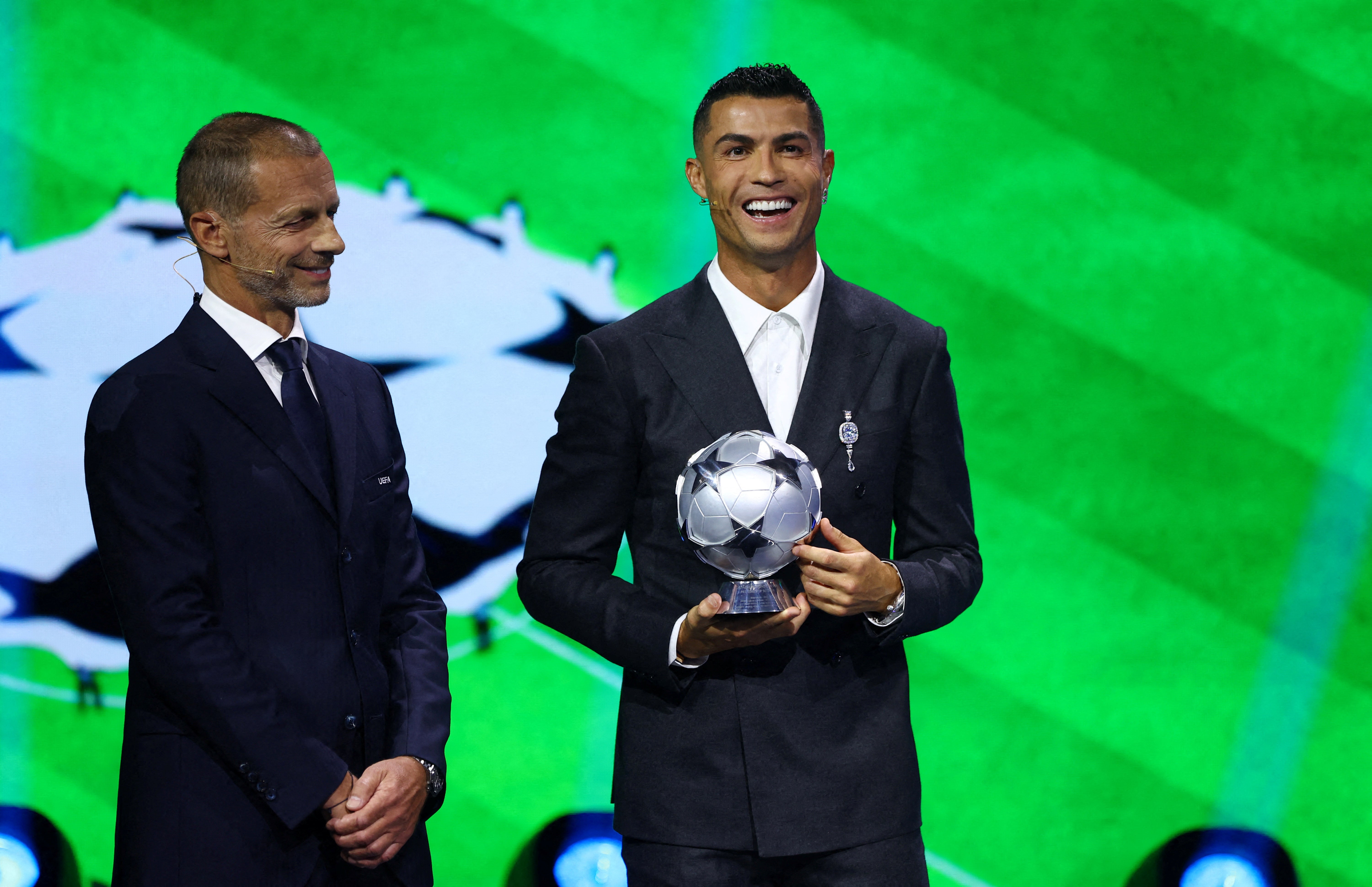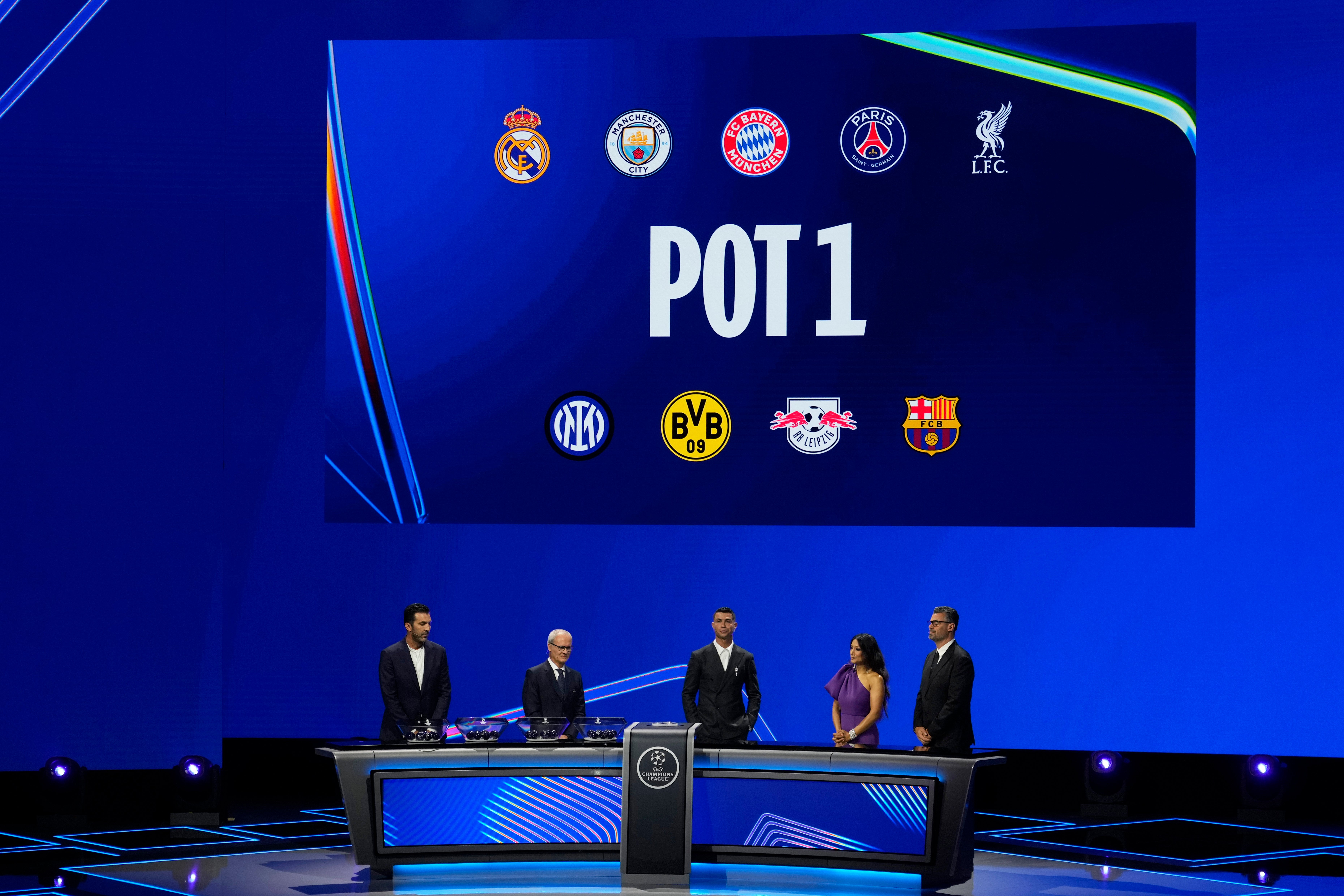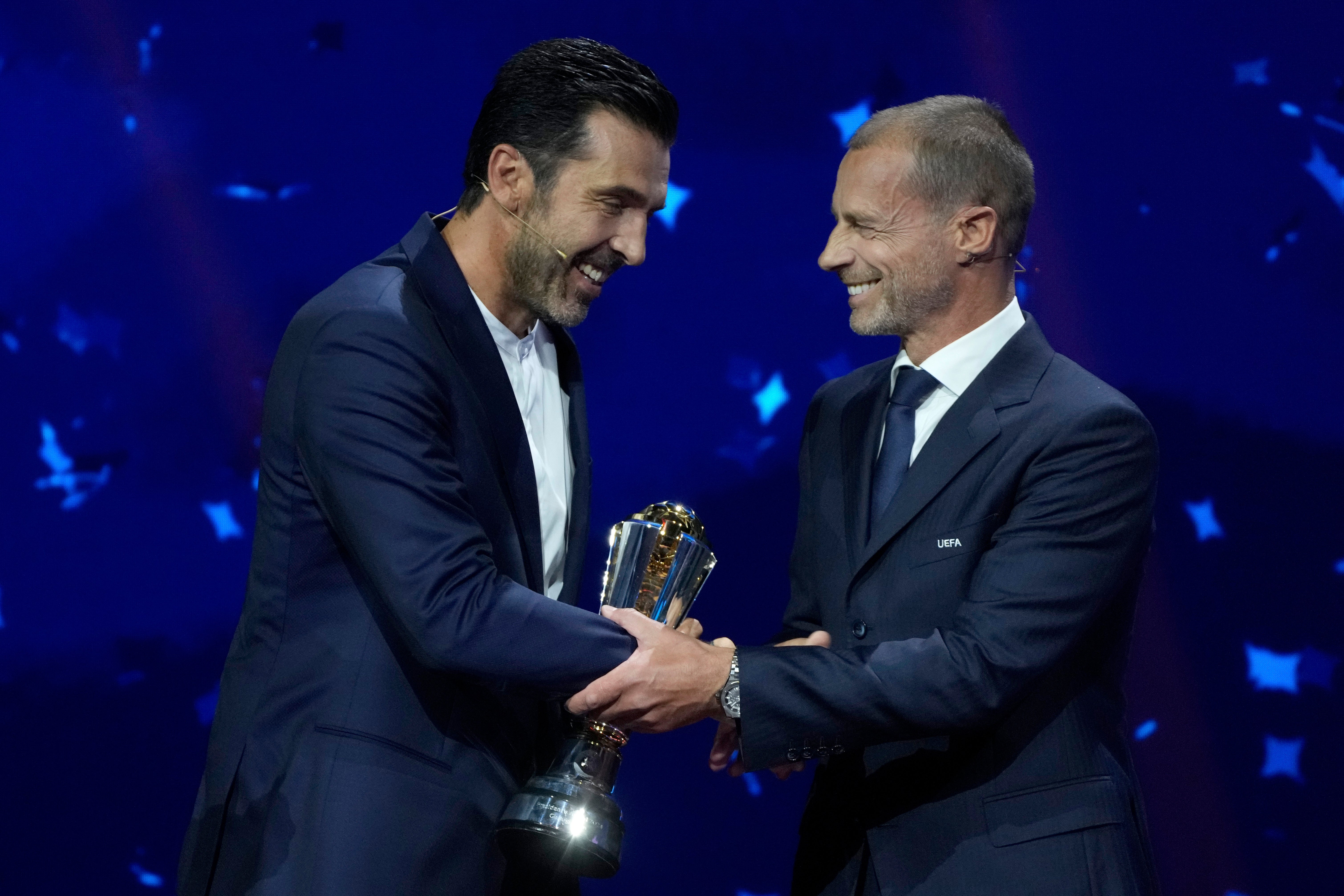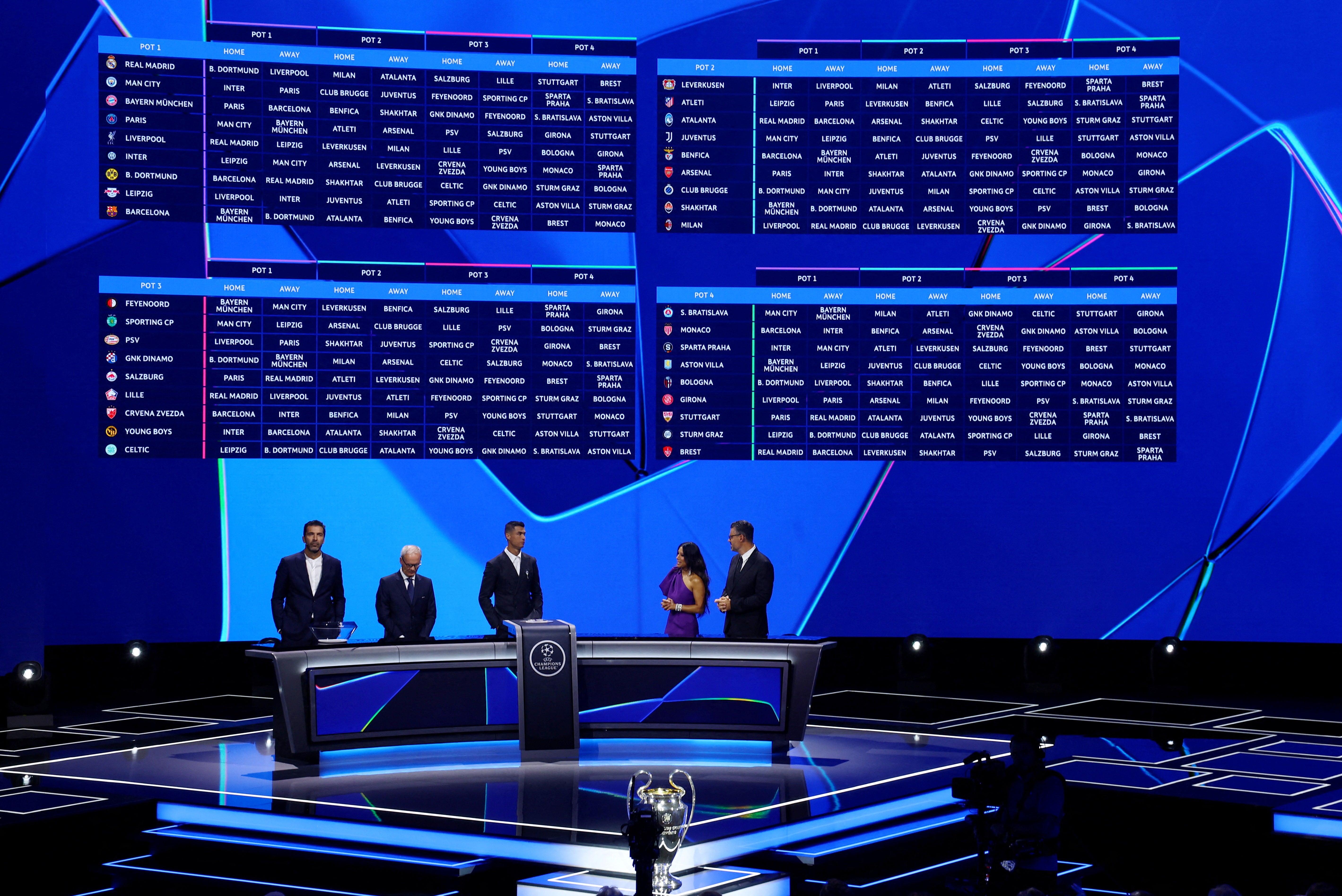Bizarre rebrand for Aleksander Ceferin is just one lingering question from the new Champions League
The chief of Uefa was referred to as ‘Mr President’ as he appeared in a strange promo video

The one thing to remember with this new Champions League, if you actually managed to register the vast list of fixtures quickly presented on the screen, is that we won’t truly know how it works until it’s actually played.
It might work well. Uefa feel the modelling has been successful, and Thursday’s draw has thrown up some exciting games, with storylines. Some of the last five finals are being replayed, including Real Madrid-Liverpool. The Reds also face Xabi Alonso’s Bayer Leverkusen, as Arsenal host Mikel Arteta’s former club in Paris Saint-Germain and Aston Villa get to replay their victorious 1982 final against Bayern Munich.
There are certainly more games between wealthy clubs, which is of course the reason why we’re all here. This format was agreed the morning after the ill-fated Super League was launched in April 2021, and it was the very threat of that plan that essentially forced Uefa into this in the first place.
It weighed over everything, to the point the two words were almost said. Zlatan Ibrahimovic was about to describe the competition as Aleksander Ceferin’s Super League in a bizarre promo video, only for the Uefa president to theatrically cut him off. Even before that, there were the coded digs at one of the chief architects of the Super League, in former Juventus head Andrea Agnelli. Awards were given to Gigi Buffon, one of the Italian club’s greatest legends, and Cristiano Ronaldo, the player Agnelli specifically signed to try to move Juve into a higher sphere. Buffon described this as the most important club competition, while Ronaldo had a starring line pressing the gameshow-style button that revealed the software’s pick of fixtures.
There was still a moment when it looked like the fixtures came up a millisecond before the button was pushed, maybe giving away it was just there for show.
Then again, that was part of the point. Given that Uefa themselves said most of it had to be done electronically since a manual draw would take four hours, they could have literally just pressed a button that set the whole thing and then sent out some emails.
They still wanted some kind of show in order to both foster the competition’s sense of spectacle, and because that’s what you do in modern entertainment. The irony was that the actual format didn’t quite suit this.

One of the virtues of the classic 32-team eight-group system was that you instantly saw who you were up against and could immediately register what it meant. That had an inherent tension. You only have to consider, too, how you can essentially recall the groups for a World Cup, say, within a day.
On that, the common complaint about the old Champions League was that the group stage had become stale. This is true, but it wasn’t down to format. The format worked in exhilarating fashion in the World Cup, to the point Fifa had to abandon plans for their own restructure. The problem was financial disparity, where 15 of the 16 wealthiest clubs always qualified, and that hasn’t been addressed. This format is almost certain to make it worse, since it has all been done at the behest of the super clubs. Less wealthy clubs may get more money, but that is out of a much bigger pot, with even more going to the richest. That is the point of these extra games.
That very calendar also undermined the point of this draw show. Against the cleanliness of eight groups of four, this was just long lists of fixtures, that were up in a flash and almost too quick to register.
It almost became a case of trying to see the more eye-catching games. It didn’t work in terms of tension or buzz, because we don’t yet know how it’s going to work in practice. There was also the fact that the actual match schedule won’t be out until Saturday. So, although Bayern Munich’s trip to Villa Park came out last, it may end up one of the first games.
They weren’t the only questions from the draw. There was also the bizarre starring role of “Mr President”, as the Uefa chief was literally called. Ceferin was everywhere, more central to it all than genuine legends that have won the trophy like Luis Figo and Alessandro Del Piero. There was at least an amusing barb at Zlatan over never winning this competition, which was admittedly well delivered by Ceferin.

As much as a launch for the new Champions League, then, it almost felt a relaunch for the Uefa president – as if he wants to make himself front and centre. It is a move that stands out all the more amid recent controversies about changing statutes so he might get to have one more term and stay on for four more years. Another irony is that Ceferin has been largely in the background throughout his time at Uefa.
Even people in football would struggle to pick him out. It has only been at big moments, like with the Super League, where he has been visible. He was largely happy to leave this kind of thing to Giorgio Marchetti.
Now, as if belatedly struck by how Gianni Infantino first created his international profile through conducting this very draw, Ceferin is right there in the middle.
The question is why. He’s just a football administrator. It remains one of football’s great mysteries, and one of its modern problems, how its inexplicable governance structure imbues so much authority in what are executive presidents. It means the power of the club game or the World Cup is afforded to random middle-aged white men. That is something almost not discussed enough in modern football, especially since it’s so important.
These are among the reasons we are here, surveying this huge list of games.

They add up to 144 for the group stage, which is 75 per cent of the total for the competition, and that to get rid of just a third of the teams – 12 of 36.
There’s a temptation to say we already know who they will be, but we shouldn’t be completely churlish about this new competition. Elements of it look good. There are intriguing games, and an unpredictability from the fact this is a new venture.
Maybe former finalists and winners like Club Brugge and Celtic might have a chance to do something different. Uefa’s modelling suggests most teams won’t know their final position until the final matchday, with eight going through automatically and a further 16 going into another play-off.
That still sounds so bloated – which is kind of the point. You can even hear it in the altered theme music.
Join our commenting forum
Join thought-provoking conversations, follow other Independent readers and see their replies
Comments
Bookmark popover
Removed from bookmarks